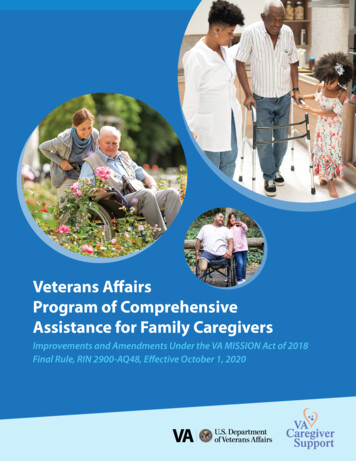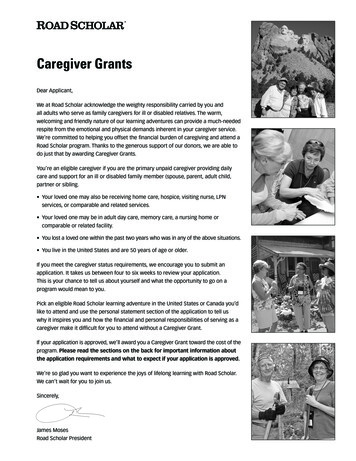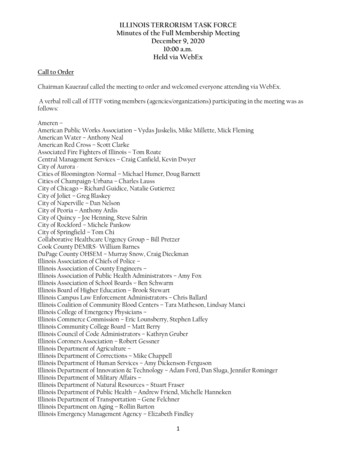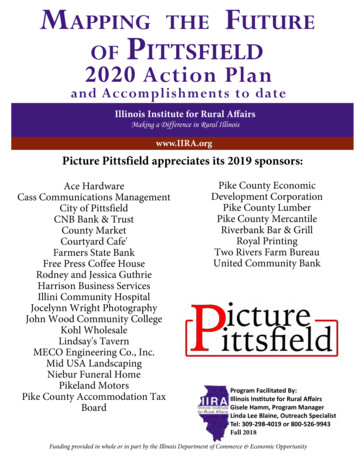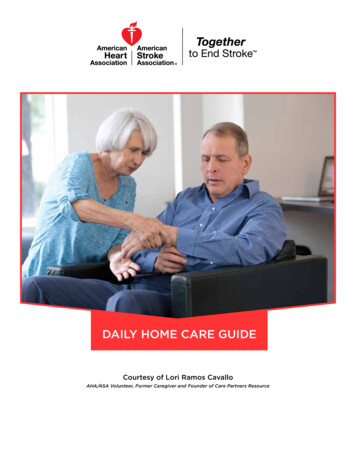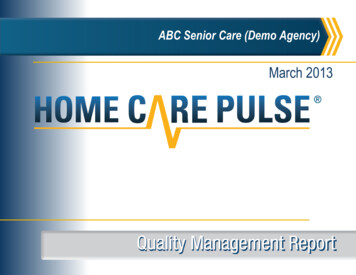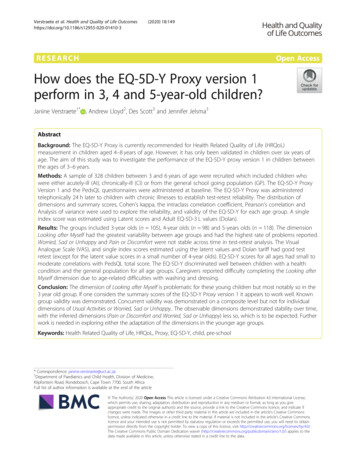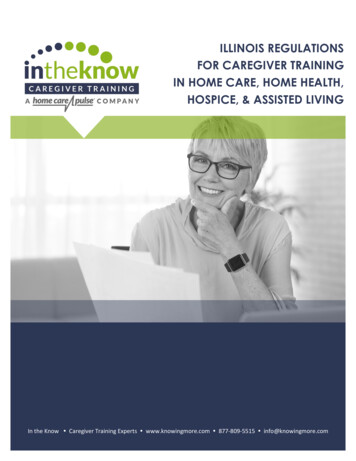
Transcription
ILLINOIS REGULATIONSFOR CAREGIVER TRAININGIN HOME CARE, HOME HEALTH,HOSPICE, & ASSISTED LIVINGIn the Know Caregiver Training Experts www.knowingmore.com 877-809-5515 info@knowingmore.com
TABLE OF CONTENTSCaregiver training requirements for:Home Care – Home Services Worker(Non-Medical Home Care)3-4Home Care / Homecare Aide(CCP-Medicaid)5-7Home Health Aide8-9Hospice Aide10Assisted Living Aide11Alzheimer's Disease and Related Services Act12 2020 In the Know,www.knowingmore.comIMPORTANT:The clinical team at In the Know strives to provide accurate information about training requirements.However, state regulations can change frequently, and the exact information is often difficult to find anddecipher. To complicate matters, each state surveyor may interpret regulations differently, makingsatisfactory implementation challenging. Please use this guide as an informal tool to help you maintaincompliance. It is not a substitute for official communication or publication by your state licensing departmentor your accrediting agency.
Training requirements for:HOME SERVICES WORKER (NON-MEDICAL HOME CARE)ILLINOIS REGULATION:Title 77, Chapter I, Subchapter B, Part 245, Section 245.71: Qualifications And Requirements For Home Services WorkersINITIAL TRAINING:Each home services agency shall provide or arrange for a minimum of eight hours of training for each home services worker.Four hours of training shall be provided prior to the home services worker's first assignment, and the remaining four hoursshall be provided within the worker's first 30 days after employment. The training shall include:ILLINOIS REQUIREMENTIN THE KNOW EQUIVALENT OPTIONSThe employee's job responsibilities and limitations; None (Provide agency training, including job description.)Communication skills relating to persons who are hard of hearing,have dementia, or have other special needs; Special Communication NeedsObserving, reporting and documenting client status and the care orservice provided, including changes in functional ability and mentalstatus demonstrated by the client; Reporting & Documenting Client Care Recognizing & Reporting Abnormal ObservationsPerforming personal care tasks for clients, including bathing; skincare; hair care; nail care; mouth care; shaving; dressing; feeding; assistance with ambulation; exercise and transfers; positioning; toileting; and medication reminding; Activities of Daily Living Performing Mouth Care Feeding Your Clients Performing Safe Transfers Toileting Tips The Basics of Medication AdministrationAssisting in the use of specific adaptive equipment, such as amechanical lifting device, if the worker will be working with clientswho use the device; Using Assistive Devices Helping with Mobility Mechanical Lift Use & SafetyBasic hygiene and basic infection prevention and control practices; Infection Control in Home Care HandwashingMaintaining a clean, safe and healthy environment; Housekeeping BasicsBasic personal and environmental safety precautions; Home Care Safety TipsRecognizing emergencies and initiating emergency procedures,including basic first aid and implementation of a client's emergencypreparedness plan; Disaster Planning Basic First AidConfidentiality of client's personal, financial and health information; Maintaining ConfidentialityBathing TipsBeyond the Bathtub (Bathing Alternatives)Dressing & Grooming TipsMORE ON NEXT PAGE — .
Training requirements for:HOME SERVICES WORKER (NON-MEDICAL HOME CARE) — CONT.INITIAL TRAINING, CONTINUED:ILLINOIS REQUIREMENTIN THE KNOW EQUIVALENT OPTIONS Understanding dementia;Problem-solving skills to care for patients with dementia who exhibit challenging behavior; Understanding DementiaDealing with Difficult & Combative PeopleRecognizing & Managing Catastrophic ReactionsBehaviors that would constitute abuse or neglect and the legalprohibitions against these behaviors, as well as knowledge andunderstanding of abuse and neglect prevention and reportingrequirements; and Understanding Abuse Understanding NeglectAny other task that the agency may choose to have the workerperform. Agency’s choice.ONGOING TRAINING:All home services workers shall complete a minimum of eight hours of training during each year of employment.Training shall include:ILLINOIS REQUIREMENTIN THE KNOW EQUIVALENT OPTIONSPromoting client dignity, independence, self-determination, privacy, choice and rights; Disaster procedures;Hygiene and infection control; andAbuse and neglect prevention and reporting requirements.Providing Client-Centered CareMaintaining Your Clients' Dignity Disaster Planning Fire Prevention & Safety An Infection Control Update Bloodborne Pathogens Understanding Abuse Understanding NeglectALZHEIMER’S & DEMENTIA INITIAL TRAINING:Per the Alzheimer's Disease and Related Services Act, all staff with direct access to clients with Alzheimer's disease or relateddementia hired after June 2, 2019 shall complete a minimum of 6 hours of initial training in the first 60 days of employment.SEE PAGE 12 OF THIS DOCUMENT FOR MANDATED CURRICULUM.ALZHEIMER’S & DEMENTIA ONGOING TRAINING:Per the Alzheimer's Disease and Related Services Act, staff with direct access to clients with dementia shall receive 3 hours ofadvanced training on caring for individuals with Alzheimer's disease and related dementias each year.SEE PAGE 12 OF THIS DOCUMENT FOR MANDATED CURRICULUM.
Training requirements for:HOME CARE / HOMECARE AIDE (CCP-MEDICAID)ILLINOIS REGULATION:Title 89, Chapter II, Part 240, Section 240.1535: In-Home Service Staff Positions, Qualifications, Training And ResponsibilitiesINITIAL TRAINING:New employees shall receive 24 hours of initial pre-service training, including agency orientation of not more than 2 hours,prior to assignment to provide services to a CCP participant without a supervisor or trainer present (not to exceed a 6 monthperiod from the training to first assignment). Initial homecare aide training shall be subject to a competency evaluationconducted by the agency and include all in-home services (see Section 240.210), as well as the following additional topics:ILLINOIS REQUIREMENTIN THE KNOW EQUIVALENT OPTIONSThe homecare aide's job responsibilities and limitations; None (Provide agency training, including job description.)Communication skills, including communicating with specialparticipant populations such as the hearing impaired andparticipants with dementia or other special needs; Special Communication NeedsObservation, reporting and documentation of participantstatus and of the service furnished; Reporting & Documenting Client Care Recognizing & Reporting Abnormal ObservationsPerformance of specific service components of in-homeservices authorized under Section 240.210(a), including, butnot limited to, personal care, positioning/transferringparticipant, and assisting participant with exercise/range ofmotion); Activities of Daily Living Bathing Tips Dressing & Grooming Tips Performing Mouth Care Feeding Your Clients Performing Safe Transfers Toileting Tips Passive & Active Range of Motion Ability to assist in the use of specific adaptive equipment, ifthe aide will be working with participants who use the device; Using Assistive DevicesHelping with Mobility Mechanical Lift Use & Safety Infection Control in Home Care HandwashingMaintenance of a clean, safe and healthy environment; Housekeeping BasicsBasic personal and environmental safety precautions; Home Care Safety TipsUse of seclusion and restraint; Restraints & AlternativesRecognizing emergencies and knowledge of emergencyprocedures; Disaster Planning Fire Prevention & SafetyConfidentiality of participant personal, financial and healthinformation; Maintaining ConfidentialityKnowledge and understanding of abuse and neglectprevention and reporting requirements; Understanding Abuse Understanding NeglectRespiratory services; Oxygen Safety for CaregiversBasic hygiene and basic infection control practices;MORE ON NEXT PAGE — .
Training requirements for:HOME CARE / HOMECARE AIDE (CCP-MEDICAID) — CONT.ONGOING TRAINING:A minimum of 12 hours per calendar year of in-service training is mandatory for all homecare aides. Yearly training shallinclude at least 9 hours of training selected from among the following topics:ILLINOIS REQUIREMENTIN THE KNOW EQUIVALENT OPTIONSPromoting participant dignity, independence, selfdetermination, privacy, choice and rights; Providing Client-Centered Care Maintaining Your Clients' DignitySpecial characteristics of the elderly population; physical,emotional and developmental needs of the participant; The Normal Aging ProcessRecognizing participant abuse, neglect and/or exploitation;abuse and neglect prevention and reporting requirements; Understanding Abuse Understanding Neglect How to Recognize & Report Human TraffickingConfidentiality of participant information; Maintaining ConfidentialityCommunication skills; Special Communication Needs Handling Complaints Customer Service in Healthcare Standard Precautions Bloodborne Pathogens An Infection Control UpdateFire and life safety, including emergency procedures to beimplemented under the agency's all hazards disasteroperations plan; Fire Prevention & Safety Agency’s All Hazards Disaster Operations PlanDealing with adverse behaviors (e.g., mental illness,depression and aggression); Helping Clients with Mental Illness Understanding Depression Dealing with Difficult & Combative PeopleFamily dynamics; Dealing with Family MembersDiseases of the elderly; understanding Alzheimer's Diseaseand dementia; Understanding Alzheimer’s Disease Understanding DementiaBody mechanics and normal range of motion, transfertechniques and positioning; Performing Safe Transfers Taking Care of Your BackChronic illness, death and dying; Understanding Pain & the Elderly End of Life Care Talking about Death Grieving With & For Your Clients All About Corporate ComplianceUniversal precautions, blood-borne pathogens and infectioncontrol;Medicaid fraud and abuse;MORE ON NEXT PAGE — .
Training requirements for:HOME CARE / HOMECARE AIDE (CCP-MEDICAID) — CONT.ONGOING TRAINING:, CONTINUEDILLINOIS REQUIREMENTIN THE KNOW EQUIVALENT OPTIONSCultural diversity; Understanding Cultural DiversityFood, nutrition and meal planning and preparation, includingspecial diets; Planning Balanced Meals Principles of Cooking Get Ready, Get Set, Cook Mealtime with Diabetes Mealtime with Cardiovascular DiseaseMaintenance of a clean, safe and healthy environment,including laundry and house cleaning skills; Housekeeping BasicsAppropriate and safe techniques in performing and assistingwith personal care; Activities of Daily LivingAssistance with self-administered medications; The Basics of Medication Administration Over-the-Counter Medications Understanding Common MedicationsRecognizing changes in bodily functions that should bereported to the supervisor; Recognizing & Reporting Abnormal ObservationsRespiratory services; Oxygen Safety for CaregiversUse of seclusion and restraint; Understanding Restraints & AlternativesUnderstanding advance directives. Understanding Advance Directives.First aid and/or CPR; Basic First Aid Tips A CPR Update (Does not certify learner in CPR)ALZHEIMER’S & DEMENTIA INITIAL TRAINING:Per the Alzheimer's Disease and Related Services Act, all staff with direct access to clients with Alzheimer's disease or relateddementia hired after June 2, 2019 shall complete a minimum of 6 hours of initial training in the first 60 days of employment.SEE PAGE 12 OF THIS DOCUMENT FOR MANDATED CURRICULUM.ALZHEIMER’S & DEMENTIA ONGOING TRAINING:Per the Alzheimer's Disease and Related Services Act, staff with direct access to clients with dementia shall receive 3 hours ofadvanced training on caring for individuals with Alzheimer's disease and related dementias each year.SEE PAGE 12 OF THIS DOCUMENT FOR MANDATED CURRICULUM.
Training requirements for:HOME HEALTH AIDE WORKERSILLINOIS REGULATION:Title 77, Chapter I, Subchapter B, Part 245, Section 245.70: Home Health Aide TrainingINITIAL TRAINING:Successful completion of a nursing arts course that includes at least 40 hours of supervised clinical experience, in anaccredited nurse training program as evidenced by diploma, certificate or other written verification from the school, andsuccessful completion of the written portion of the Department-established nursing assistant competency test.ONGOING TRAINING:The home health or home nursing agency is responsible for ensuring that the individuals who furnish home health aideservices on its behalf are competent to carry out assigned tasks in the patient's place of residence. A competency evaluationconducted by an RN in the home health or home nursing agency shall address each of the following subjects:ILLINOIS REQUIREMENTCOURSES RELATED TO COMPETENCY EVALSCommunication skills relating to persons who are hard ofhearing, have dementia, or have other special needs; Special Communication NeedsObservation, reporting, and documentation of patient statusand the care or service furnished; Reporting & Documenting Client CareReading and recording temperature, pulse and respiration; A Vital Signs UpdateBasic infection prevention and control procedures; An Infection Control Update Bloodborne PathogensBasic elements of body functioning and changes in bodyfunction that shall be reported to an aide's supervisor; Recognizing & Reporting Abnormal ObservationsMaintenance of a clean, safe and healthy environment; Housekeeping BasicsRecognizing emergencies and initiating emergencyprocedures; Disaster Planning The physical, emotional and developmental needs of andways to work with the populations served by the home healthagency, including the need for respect for the patient, his orher privacy, and his or her property;Client-Centered CareMORE ON NEXT PAGE — .
Training requirements for:HOME HEALTH AIDE WORKERS — CONT.ONGOING TRAINING, CONTINUED:The home health or home nursing agency is responsible for ensuring that the individuals who furnish home health aideservices on its behalf are competent to carry out assigned tasks in the patient's place of residence. A competency evaluationconducted by an RN in the home health or home nursing agency shall address each of the following subjects:ILLINOIS REQUIREMENTCOURSES RELATED TO COMPETENCY EVALSAppropriate and safe techniques in personal hygiene andgrooming that include: Bed bath; Sponge, tub or shower bath; Hair shampooing in sink, tub and bed; Nail and skin care; Oral hygiene; and Toileting and elimination; Bathing Tips Beyond the Bathtub (Bathing Alternatives) Dressing & Grooming Tips Handling Incontinence of the Bowel & Bladder Performing Mouth Care Perineal & Catheter Care Toileting TipsSafe transfer techniques and ambulation; Performing Safe Transfers Helping with MobilityNormal range of motion and positioning; Passive & Active Range of MotionAdequate nutrition and fluid intake; Basic Nutrition & Hydration Nutrition for the ElderlyProblem solving with individuals with dementia who exhibitchallenging behavior; Dealing with Difficult & Combative People Recognizing & Managing Catastrophic ReactionsUnderstanding dementia; Understanding DementiaRecognizing and reporting changes in skin condition; and Common Skin Conditions, from A to ZAny other task that the agency may choose to have the homehealth aide perform, as permitted by statute. Agency’s choice.ALZHEIMER’S & DEMENTIA INITIAL TRAINING:Per the Alzheimer's Disease and Related Services Act, all staff with direct access to clients with Alzheimer's disease or relateddementia hired after June 2, 2019 shall complete a minimum of 6 hours of initial training in the first 60 days of employment.SEE PAGE 12 OF THIS DOCUMENT FOR MANDATED CURRICULUM.ALZHEIMER’S & DEMENTIA ONGOING TRAINING:Per the Alzheimer's Disease and Related Services Act, staff with direct access to clients with dementia shall receive 3 hours ofadvanced training on caring for individuals with Alzheimer's disease and related dementias each year.SEE PAGE 12 OF THIS DOCUMENT FOR MANDATED CURRICULUM.
Training requirements for:HOSPICE AIDE WORKERSILLINOIS REGULATION:Title 77, Chapter I, Subchapter B, Part 280, Section 280.2040: Personnel PoliciesINITIAL TRAINING: All new employees shall complete an orientation program covering, at a minimum, the program's philosophy and goals; job orientation, allowable duties of the new employee, safety, and appropriate interactions with patients andfamilies.ONGOING TRAINING: All employees shall attend in-service training programs pertaining to their assigned duties at least annually. Written records of program content and personnel attending each session shall be maintained.CMS GUIDELINES:42 CFR Part 418 Medicare and Medicaid Programs: Hospice Conditions of Participation.INITIAL TRAINING: Content and duration of hospice aide classroom and supervised practical training, hospice aide trainingmust include classroom and supervised practical training in a practicum laboratory or other setting in which the traineedemonstrates knowledge while performing tasks on an individual under the direct supervision of a registered nurse, or a licensed practical nurse, who is under the supervision of a registered nurse. Classroom and supervised practical training combined must total at least 75 hours.ONGOING TRAINING: A hospice aide must receive at least l2 hours of in-service training during each 12-month period. Inservice training may occur while an aide is furnishing care to a patient.IN THE KNOW RECOMMENDATIONS INCLUDE BUT ARE NOT LIMITED TO:Caring for Bedbound ClientsEnd of Life CareEthical Dilemmas in HealthcareGrieving with and For Your ClientsMaintaining Your Client’s DignityOxygen Safety for CaregiversTalking About DeathThe Five Domains of PainUnderstanding Advance DirectivesUnderstanding HospiceUnderstanding Pastoral CareUnderstanding Religious Diversity
Training requirements for:ASSISTED LIVING AIDE WORKERSILLINOIS REGULATION:2019 Assisted Living State Regulatory ReviewINITIAL (ORIENTATION) TRAINING:Each new employee must complete orientation within 10 days of their start date on topics such as the:ILLINOIS REQUIREMENTIN THE KNOW EQUIVALENT OPTIONSEstablishment’s philosophy and goals; In-house materials on philosophy and goals.Resident rights; Bill of RightsAbuse and neglect prevention; and Understanding Abuse Understanding Neglect Reporting & Documenting Client CareReporting requirements.ONGOING TRAINING:Each manager and direct care staff member shall complete a minimum of eight hours of ongoing training, applicable to theemployee's responsibilities, every 12 months after the starting date of employment. The training shall include:ILLINOIS REQUIREMENTIN THE KNOW EQUIVALENT OPTIONSPromoting resident dignity, independence, selfdetermination, privacy, choice, and resident rights; Client-Centered Care Maintaining Your Clients' DignityDisaster procedures; Disaster PlanningHygiene and infection control; An Infection Control Update Standard Precautions HandwashingAssisting residents in self-administering medications; The Basics of Medication AdministrationAbuse and neglect prevention and reporting requirements; Understanding Abuse Understanding Neglect Activities of Daily LivingAssisting residents with ADLs.ALZHEIMER’S & ALZHEIMER’S & DEMENTIA INITIAL & ONGOING TRAINING:Per the Alzheimer's Disease and Related Services Act, staff with direct access to clients with dementia shall receive a specificnumber of hours of advanced training on caring for individuals with Alzheimer's disease and related dementias each year.SEE PAGE 12 OF THIS DOCUMENT FOR MANDATED CURRICULUM.MORE ON NEXT PAGE — .
Training requirements for:ALZHEIMER’S DISEASE & RELATED SERVICES ACTALZHEIMER’S & DEMENTIA INITIAL TRAINING:Per the Alzheimer's Disease and Related Services Act, all staff with direct access to clients with Alzheimer's disease or relateddementia hired after June 2, 2019 shall complete a minimum of 6 hours of initial training in the first 60 days of employment.The curriculum shall include, at a minimum, the following topics:ILLINOIS REQUIREMENTIN THE KNOW EQUIVALENT OPTIONSUnderstanding dementia (e.g., hoarding, paranoia,hallucinations, and sundown syndrome); Understanding DementiaEffectively communicating with individuals with dementia; Communicating with Clients with Alzheimer'sAssisting individuals with dementia in performing activities ofdaily living; and fundamentals of dementia care; Understanding Alzheimer’s Disease & Related Dementias(ADRD) - 2 hoursProblem solving with individuals with dementia who exhibitchallenging behavior (e.g., aggressive and catastrophicbehaviors); Recognizing & Managing Catastrophic ReactionsSafe environments (e.g., wandering); Safe Environments for Clients with Dementia & Alzheimer'sDiseaseManaging the activities of individuals with dementia. Activities for Clients with Alzheimer’s DiseaseALZHEIMER’S & DEMENTIA ONGOING TRAINING:Per the Alzheimer's Disease and Related Services Act, staff with direct access to clients with dementia shall receive 3 hours ofadvanced training on caring for individuals with Alzheimer's disease and related dementias each year. The mandated trainingshall include, at a minimum:ILLINOIS REQUIREMENTIN THE KNOW EQUIVALENT OPTIONSPromoting resident dignity, independence, individuality,privacy, and choice; Client-Centered Care Maintaining Your Client’s DignityResident rights and principles of self-determination; Bill of Rights Understanding & Supporting Advance DirectivesCare of elderly persons with physical, cognitive, behavioraland social disabilities; and Dealing with Difficult & Combative People Understanding Basic Human NeedsEffectively communicating with individuals with dementia. Communicating with Clients with Alzheimer's
HOME CARE PULSE IN THE KNOWCombine detailed client/caregiver insightswith top-rated caregiver training.See why 6,000 healthcareorganizations trust IN THE KNOW tomeet their caregiver training needs.Connect with one of our surveyprogram experts to learn more aboutHOME CARE PULSECaregiver Training:Client/Caregiver Surveys:170 CE courses, approved in all states.Monthly phone surveys21 courses translated into SpanishRegional and industry benchmarkingExclusive 8-Hour Caregiver Certification Series.Custom reports to pinpoint areas of improvement12-Module Home Care Supervisor Success Series.Data trends over timeGet a QuoteSee PricingBUNDLE & SAVE!Get 10% off both services when you sign up for Client & Caregiver Experiencesurveys from Home Care Pulse and Caregiver Training from In the lse.com
HOSPICE, & ASSISTED LIVING . In-Home Service Staff Positions, Qualifications, Training And Responsibilities INITIAL TRAINING: New employees shall receive 24 hours of initial pre-service training
